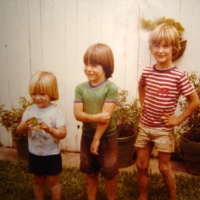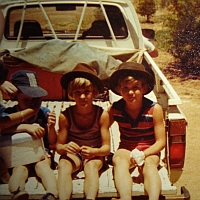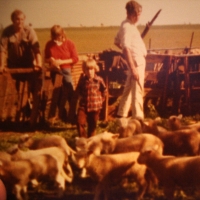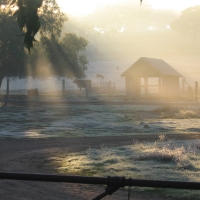- About Us
- Columns
- Letters
- Cartoons
- The Udder Limits
- Archives
- Ezy Reading Archive
- 2024 Cud Archives
- 2023 Cud Archives
- 2022 Cud Archives
- 2021 Cud Archives
- 2020 Cud Archives
- 2015-2019
- 2010-2014
- 2004-2009
 |
For Vera |
Little Johnny sits on Vera’s knee. Aged 6. Christmas. 1983.
He lolls forward at the chin like there’s a loose hinge at the back of his neck and slips in and out of sleep. Dips to black. He’s never felt so comfortable and he resigns himself not to fight it. In a giant teak cabinet sits a colour TV which flickers and spits out a blend of static white noise  and Christmas Carols. Vera watches it and, as she does, Little Johnny steals a look at the side of her face — cracked and worn, slapped thick with makeup which lies deep in the wrinkles like grout. He scans the face thoroughly, carefully following the lines from their point of origin, across a cheek like a plain, dotted by splotches of darker skin, patches of makeup not fully leveled out. He follows its tributaries. Beyond the jaw line where they twist and split and chase each other to the corner of an eye, still rich and blue and full of sparky life. Little Johnny has heard his mother call them laugh lines and he loves that she laughs as she says it.
and Christmas Carols. Vera watches it and, as she does, Little Johnny steals a look at the side of her face — cracked and worn, slapped thick with makeup which lies deep in the wrinkles like grout. He scans the face thoroughly, carefully following the lines from their point of origin, across a cheek like a plain, dotted by splotches of darker skin, patches of makeup not fully leveled out. He follows its tributaries. Beyond the jaw line where they twist and split and chase each other to the corner of an eye, still rich and blue and full of sparky life. Little Johnny has heard his mother call them laugh lines and he loves that she laughs as she says it.
Asleep again and his tiny head rises, falls, above a giant gentle heart pounding like a piston beneath this purple chiffon dress. This room, this house, smells of a thousand things. Little Johnny has learnt to isolate them all. Of course there’s the makeup, there’s the hint of hairspray that smells more chemical than perfume and of gas from the fire, there’s a pinch of wet grass — the secondhand kind like it’s still stuck to the bottom of someone’s shoe. Overwhelmingly, it smells warm. From next door floats the strongest of them all. Sweet and rich, fresh mint slice left to cool on the open oven door. Vera remembers the favourite treat of each of her 8 grandchildren. Frankie likes lamingtons — Johnny, mint slice.
Little Johnny shuffles his weight, feels the chiffon slip. Vera sleeps. Awakens. Looks Johnny in the eyes and smiles, whispers ‘you’re my special one.’
Little Johnny sits at Vera’s feet.
Outside, his younger cousins kick dust through the paddocks, chase lambs, skip stones while their mums, Johnny’s aunts, draw long baths. He helps her in the kitchen. She’s making Pavlova — his brother’s favourite. She tells him how when she was a girl Johnny’s age she rode to school in a horse and cart and that it took her 2 hours  every morning. That even in winter, they left in the dark. Johnny laughs, then feels self-conscious like he shouldn’t have. Like it wasn’t supposed to be funny. Johnny takes a rifle and loses an afternoon shooting rabbits and black jays. When there aren’t rabbits and black jays he shoots beer bottles and faded purple cans of Tab. He only comes home when he hears the spring click on the back porch door and his Mum yell his name.
every morning. That even in winter, they left in the dark. Johnny laughs, then feels self-conscious like he shouldn’t have. Like it wasn’t supposed to be funny. Johnny takes a rifle and loses an afternoon shooting rabbits and black jays. When there aren’t rabbits and black jays he shoots beer bottles and faded purple cans of Tab. He only comes home when he hears the spring click on the back porch door and his Mum yell his name.
They pack sandwiches and cordial into a hamper and pile into the truck - he learns to drive in this old Hilux, the dusty cushions stacked high, cattle tags skipping across the dash. Johnny turns the wheel while Vera works the stick shift. Little Johnny sits on Vera’s lap.
Little Johnny sits on Vera’s lap.
It’s the day his Grandfather was buried. The room is full of men in hats and suits. Farmers with suits for weddings, funerals and horse races. The room once so familiar looks different, feels like it’s not Johnny’s anymore. They come in a line and pat his head, lean past him to kiss Vera on the cheek, offer their sympathies, grab a fistful of peanuts and move on. Every spare inch of carpet is covered with bunches of bright flowers –Johnny has never felt the room like this. That morning he stood in church, cream pants, chambray shirt, his hair parted and patted down. He stood and held Vera’s hand, held it until a layer of sweat split the skin, held it tighter and tighter in the hope that maybe, just maybe, it would make it stop trembling. That he could make it stop trembling. He meets new uncles and new cousins. He’s old enough to understand death but not its implications. Not the flow-on. He’s old enough to know that a part of Vera just left the building.
Love sits in the particles, dense. Like when your older brother teaches you to tie a tie. Like when your mother shows you how to hold the cuffs of your shirt when you pull on a jumper.
Johnny sits at Vera’s side.
She looks at him deliberately now and he knows he reeks of cigarette smoke and of teenage musk. Teenage indifference. She’s watching an Elvis movie but, without asking, he takes the remote and flicks the channel. He gets up and goes to the kitchen for a Coke. He doesn’t ask if she’d like anything. There’s a bowl of peanuts on the table between them and he eats them all. They sit like this for hours. Vera talks, asks how schools is, has he made nice friends, is he playing sport, does he miss home. Johnny says good, yep, yep, nup. A week slips past and Johnny assembles on the lawn with his cousins — the obligatory grandma photo. He’s tall and awkward now, gangly and pimply, he stands at the back behind Vera — makes rabbit ears. In the developed shot, Johnny’s the only one not smiling. Vera pulls him tight, says goodbye, says I love you, slips a $20 note in his hand and says ‘God bless you Johnny — you’re my special one.’ And she stands at the gate and waves as the car kicks dust down the driveway. She’s still there waving as the car pulls onto the highway. Johnny has his headphones on.
Johnny kneels at Vera’s pew.
A tiny weatherboard country church, rammed with kids tugging on floral dresses. It stinks of wood and hairspray, hums with electricity as dozens of children, kinetic, itch to get back to their presents.  When they arrive, all the men one by one, greet Vera and help her down the aisle to her seat. Vera says, ‘Oh thank you John, oh thank you Sam, oh thank you Peter. God Bless.’ Johnny watches her through the service. Tunes out to the sermon. Thinks about her life. Really thinks. Thinks of what she’s seen. World wars, television, cars, planes, conscripted wars, moon landings, the Breville. Johnny thinks of what he’s seen - the Internet, mobile phones, GPS navigation. All instruments motivated by a generation’s laziness he thinks. That’s what Johnny thinks.
When they arrive, all the men one by one, greet Vera and help her down the aisle to her seat. Vera says, ‘Oh thank you John, oh thank you Sam, oh thank you Peter. God Bless.’ Johnny watches her through the service. Tunes out to the sermon. Thinks about her life. Really thinks. Thinks of what she’s seen. World wars, television, cars, planes, conscripted wars, moon landings, the Breville. Johnny thinks of what he’s seen - the Internet, mobile phones, GPS navigation. All instruments motivated by a generation’s laziness he thinks. That’s what Johnny thinks.
Johnny’s had a tough year at school. His final one. Some things got in the way and they shouldn’t have and it cost him in the points department but every Friday in the boarding house a prep-kid slid a letter under his study door. Every one finished the same. ‘I have the nuns in town praying for you Johnny. God Bless. I love you. You’re my special one.’
The cousins assemble again on the lawn. Snap, Snap. Vera slips him another $20. It’s the same every year — has been since he was 5. He’s going to London for the year — leaves in a week. This farewell lasts longer, has a thicker air to it. Johnny knows that what goes unsaid is that she’s crying because she’s worried she’ll die in the next 12 months. That this might be the last time she sees him.
Johnny stands on the freshly cut grass, his body convulsing, legs wobbling like he’s naked in the snow. He sobs so heavy he can’t breathe properly, can’t see. Everything around him is blurred. He didn’t think he could cry any more, not this hard, not this aggressive. He can’t believe he’s standing on his father’s grave. That somewhere underneath him is Dad. Sure as shit, this wasn’t in the plan. He tries to pull it together because he’s aware of people around him whispering and shuffling their weight between feet. It’s that or the trees. He can hear people sigh. It’s them or the trees.  He measures his breathing and for a moment gets it back in balance — slows the sobs down but then like a flash he thinks… somewhere underneath him is Dad — and he’s gone again. He needs a cigarette. He feels like someone has a fist around his lungs, his heart. He spots a group of men walk through the cemetery gate — they walk at each other’s shoulder like a cowboy movie scene, taking their hats off as they draw closer. Johnny thinks that no one, fucking no one knows how he feels right now. He scans the faces under the tree but can’t see for the tears till his eyes pull focus and Vera steps forward, wraps her arms around him and holds him tight. Tighter than his little hand held hers 14 years earlier. He sobs into her shoulder and she holds him tighter, tighter. He buries his face in the crook of her neck and then realizes that she’s crying too. In time, for a moment, their bodies heave in sync.
He measures his breathing and for a moment gets it back in balance — slows the sobs down but then like a flash he thinks… somewhere underneath him is Dad — and he’s gone again. He needs a cigarette. He feels like someone has a fist around his lungs, his heart. He spots a group of men walk through the cemetery gate — they walk at each other’s shoulder like a cowboy movie scene, taking their hats off as they draw closer. Johnny thinks that no one, fucking no one knows how he feels right now. He scans the faces under the tree but can’t see for the tears till his eyes pull focus and Vera steps forward, wraps her arms around him and holds him tight. Tighter than his little hand held hers 14 years earlier. He sobs into her shoulder and she holds him tighter, tighter. He buries his face in the crook of her neck and then realizes that she’s crying too. In time, for a moment, their bodies heave in sync.
Johnny stands at Vera’s gate. He’s off traveling for six months. Off to see the world. Vera cries like it’s the last time she’ll see him. Like she’ll die while he’s gone. Like she did when he went to London. That was 10 years ago.
Johnny stoops at Vera’s knee. Aged 30. She’s 93.
She whispers and he leans in close. He knows every line on this face. She sips a cup of tea. Eats a biscuit. Johnny tells her his holiday was great, he saw some amazing places, met some good people. Vera looks at him and asks, ‘And how is school going Davey?’ His aunt interrupts, says ‘Mum, this is Johnny not Davey.’ Vera says, ‘Ah, Johnny of course, how stupid of me. I always said you were my special one.’
